SUMMARY
This is AI generated summarization, which may have errors. For context, always refer to the full article.
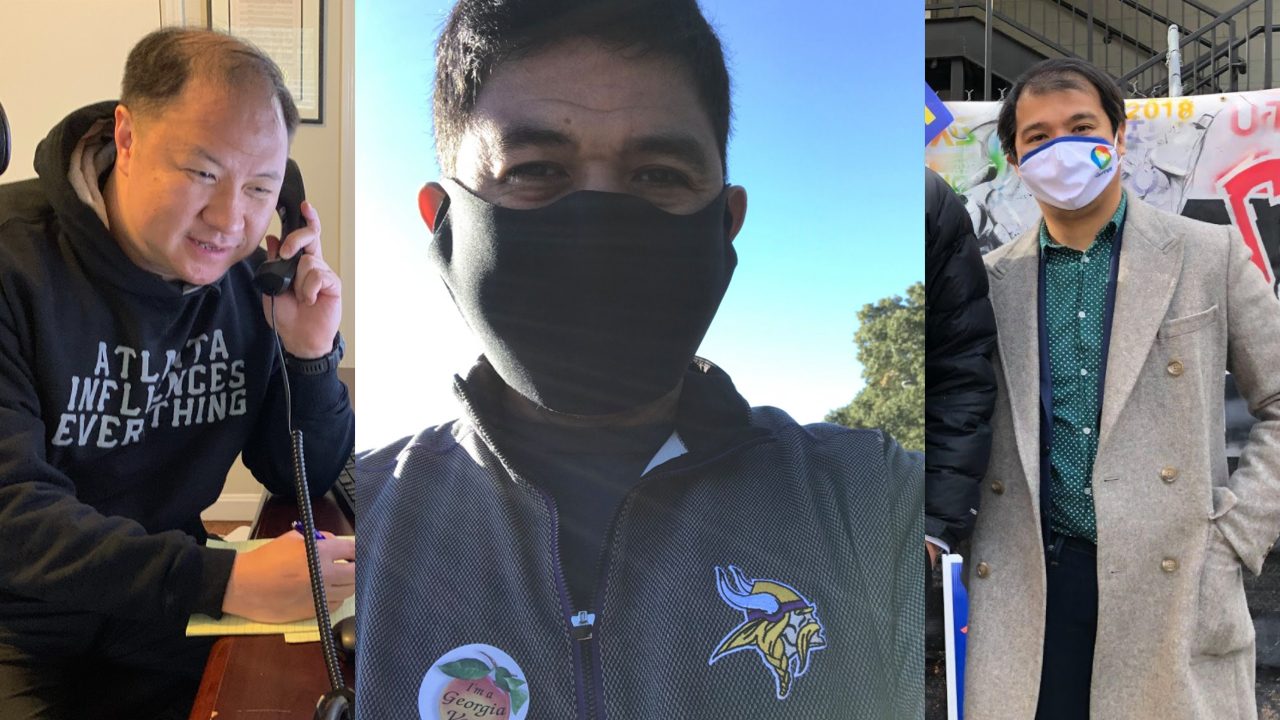
On a recent morning in Atlanta, Georgia, Filipino-American (Fil-Am) Jayson Alay-ay sat down at his kitchen table to fill out a ballot. A 40-something main-frame programmer who relocated to Georgia with the wave of Filiipino technology and medical professionals who migrated there in the 1990s, he had already put in the decade or so it took to become a US citizen and had been participating in national and local elections for some time.
Requesting and casting the mail-in ballot itself was easy, but it did take some commitment on Alay-ay’s part to stay engaged throughout the process. Thoughtful and reserved, he enumerated the issues that kept him motivated: “I’d like to see advancements in clean energy and genetic modification, and the decriminalization of cannabis for medical use.”
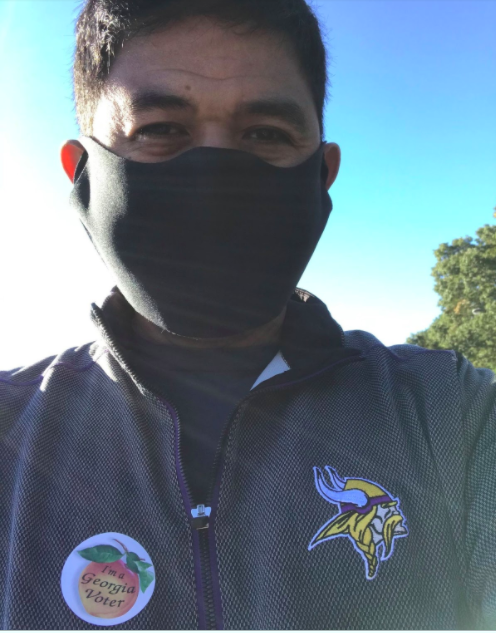
Joe Biden has won the US presidential election, but in a cliff-hanger conclusion befitting the kind of year 2020 has been, Americans have yet to find out whether he will be able to enact the platform he campaigned on. For the short-term, Biden has promised a massive relief package to shore up local governments, small businesses, and the unemployed affected by the pandemic, funded by increased taxes on the wealthiest Americans and a roll-back of Trump-era corporate tax cuts. In the medium-term, his priorities include racial equity legislation and addressing climate change in America and beyond. To do so, Biden will need a majority in the US Senate where the tally currently rests at 48:50 in favor of the opposing Republican party.
There are two remaining Senate seats up for grabs in the state of Georgia, for which runoff elections will be held on January 5. If Biden and the Democrats win both, they would then have 50 Senate seats, which when counted with the tie-breaking vote of the Vice President, would give them the votes they need to pass legislation by the slimmest of margins.
This nail-biter has generated feverish interest in Georgia. The state voted for Biden, going for a Democratic president for the first time in 30 years. As the dust settled in the days following the presidential election, it became apparent how the flip occurred and what it meant for the runoffs. It will perhaps not surprise Filipinos to discover, given our impressive propensity to materialize wherever the action is, that there is a Pinoy twist to this story.
According to TargetSmart, a polling firm, Asian-Americans were decisive to Biden’s win. Their turnout doubled compared to the 2016 US presidential election, which voter registration statistics show was roughly equivalent to 200,000 active Asian-American voters in the state. Exit polls revealed they voted 2:1 for Biden, which further underscored their importance as a voting bloc when taken in the context of Biden’s 12,000-vote margin of victory. Filipino-Americans, as the second-largest subgroup within this demographic, played a crucial role in the victory, and could have an equally important role to play in the upcoming Senate runoffs.
To Fil-Am Bryan Ramos who sits on the board of Asian-Americans Advancing Justice-Atlanta (Advancing Justice), a nonprofit credited with doing much of the hard work on the ground to get Asian-American voters to the polls, the results were exhilarating.
“We’ve been doing this work for almost a decade but had an educated estimation that Asian-Americans could make the difference in an election. We have now moved from being the margin of error to becoming the margin of victory,” he enthused.
As a first-generation immigrant who moved from Quezon City to Florida with his parents when he was two years old, Ramos is a lawyer by profession.
“It’s important to know the law if you want to thrive in this country, or simply not get taken advantage of,” he said of his career choice.
He won his first case as a law student defending his parents in court against a lawn company that had wrongfully accused them of non-payment. His firm is one of two Filipino-owned law firms in Georgia taking on many of the cases of the community, with a specialization on workers’ rights.
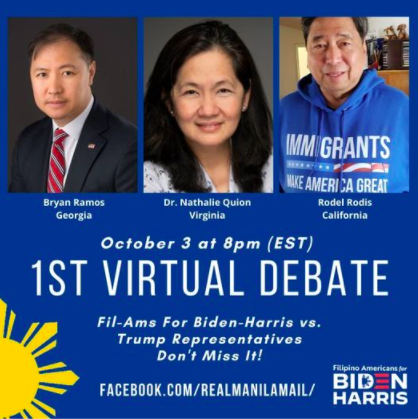
Ramos complements his non-partisan leadership role at Advancing Justice with pounding the pavement himself for the Democratic party. As the runoffs approach, he is phone-banking, writing postcards, and personally reaching out to family and contacts to encourage them to vote Democrat.
“I don’t want to look back and wonder whether there was anything else I could have done,” he said.
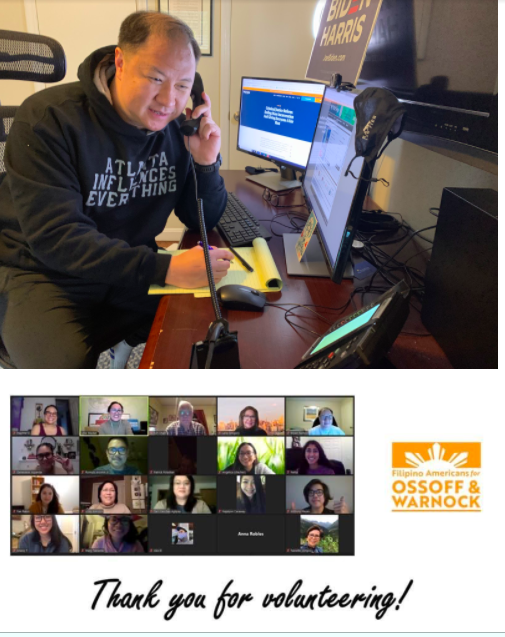
Equally active is Fil-Am Marvin Lim, who recently won a seat in Georgia’s House of Representatives – one of 3 Asian-Americans in the 180-seat chamber. Prior to winning, he was knocking on 30 doors a day.
“It’s important to start with asking people what matters to them and trying to help them with their concerns,” he said, describing his outreach to voters. “Sometimes it’s just a matter of providing numbers or websites they can get information from. Other times I’ve helped people make a call during my visit to solve problems like garbage hauling. Whatever the case, I always make sure to start with giving before I ask people to consider voting Democrat.”
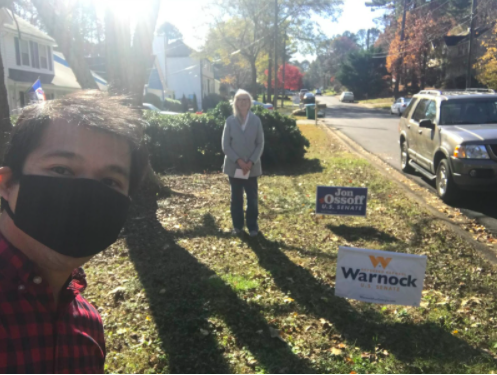
Like Ramos, Lim migrated to the US as a child and has the kind of immigrant story that would make the folks back home swoon. Overcoming joblessness and mental illness in the family, even being on public assistance programs for a time, Lim went on to graduate magna cum laude from Emory University and Yale Law School, win a Fulbright scholarship, and practice as a civil rights lawyer with storied organizations such as the American Civil Liberties Union (ACLU). He said his personal experience as an immigrant drove his public service.
“The American Dream isn’t easy to achieve. Every person deserves a leg up and government has a role to play.”
In the run up to Georgia’s January 5 elections, he continues to knock on doors, give people rides to the polls, even warm the voting lines to encourage voter participation.
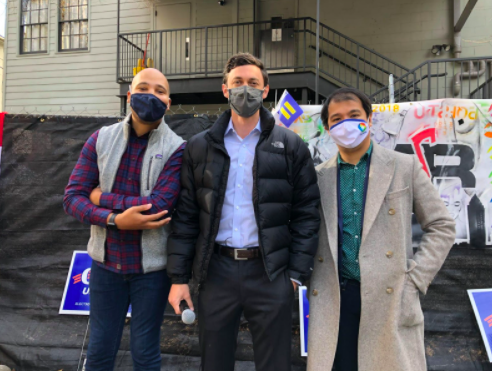
In another part of Atlanta, Vic Romero noted that, indeed, outreach to minorities like him has been aggressive.
“I’ve received 3 emails and 10 text messages to vote so far,” he recounted.
An older Fil-Am who moved to Georgia in the 1960s, Romero described himself as actively engaged in the community, having been president of the local Philippine association a couple of times. He cast his vote as soon as the polls opened for early voting on December 14.
“Most important is to get the pandemic under control and the economy back on track,” he said of his motivations. “Then we have to undo all the damage Trump has done to our environment, and repair our international relations,” he added, careful to emphasize that he “keeps informed of what’s happening in the Philippines.”
Will the Fil-Am vote again figure in changing the course of American politics and perhaps even global affairs? Alay-ay, a self-professed and keen observer of the Filipino diaspora cautioned against early and easy predictions. “Polls show that turnout is high, but that the race is tight,” he said.
How tight? We’ll find out on January 5.
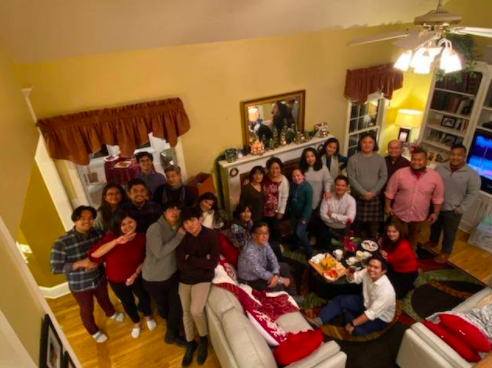
– Rappler.com
Add a comment
How does this make you feel?





There are no comments yet. Add your comment to start the conversation.